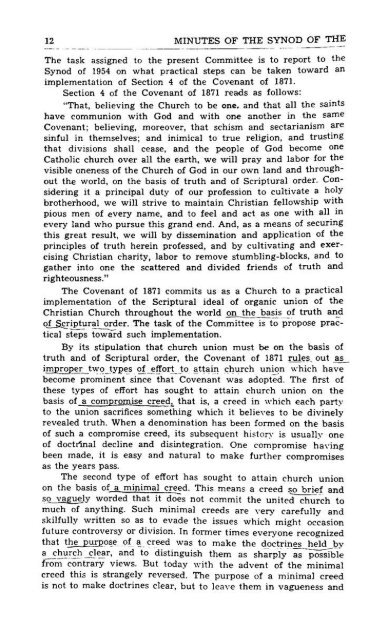Reformed Presbyterian Minutes of Synod 1954
Reformed Presbyterian Minutes of Synod 1954
Reformed Presbyterian Minutes of Synod 1954
Create successful ePaper yourself
Turn your PDF publications into a flip-book with our unique Google optimized e-Paper software.
12 MINUTES OF THE SYNOD OF THE<br />
The task assigned to the present Committee is to report to the<br />
<strong>Synod</strong> <strong>of</strong> <strong>1954</strong> on what practical steps can be taken toward an<br />
implementation <strong>of</strong> Section 4 <strong>of</strong> the Covenant <strong>of</strong> 1871.<br />
Section 4 <strong>of</strong> the Covenant <strong>of</strong> 1871 reads as follows:<br />
"That, believing the Church to be one. and that all the saints<br />
have communion with God and with one another in the same<br />
Covenant; believing, moreover, that schism and sectarianism are<br />
sinful in themselves; and inimical to true religion, and trusting<br />
that divisions shall cease, and the people <strong>of</strong> God become one<br />
Catholic church over all the earth, we will pray and labor for the<br />
visible oneness <strong>of</strong> the Church <strong>of</strong> God in our own land and throughout<br />
the world, on the basis <strong>of</strong> truth and <strong>of</strong> Scriptural order. Considering<br />
it a principal duty <strong>of</strong> our pr<strong>of</strong>ession to cultivate a holy<br />
brotherhood, we will strive to maintain Christian fellowship with<br />
pious men <strong>of</strong> every name, and to feel and act as one with all in<br />
every land who pursue this grand end. And, as a means <strong>of</strong> securing<br />
this great result, we will by dissemination and application <strong>of</strong> the<br />
principles <strong>of</strong> truth herein pr<strong>of</strong>essed, and by cultivating and exercising<br />
Christian charity, labor to remove stumbling-blocks, and to<br />
gather into one the scattered and divided friends <strong>of</strong> truth and<br />
righteousness."<br />
The Covenant <strong>of</strong> 1871 commits us as a Church to a practical<br />
implementation <strong>of</strong> the Scriptural ideal <strong>of</strong> organic union <strong>of</strong> the<br />
Christian Church throughout the world on the basis <strong>of</strong> truth and<br />
<strong>of</strong>_S^riptural_order. The task <strong>of</strong> the Committee is to propose practical<br />
steps toward such implementation.<br />
By its stipulation that church union must be on the basis <strong>of</strong><br />
truth and <strong>of</strong> Scriptural order, the Covenant <strong>of</strong> 1871 rules out as<br />
imrjroper_two_types <strong>of</strong> effort to attain church union which have<br />
become prominent since that Covenant was adopted. The first <strong>of</strong><br />
these types <strong>of</strong> effort has sought to attain church union on the<br />
basis <strong>of</strong> a compromise creed, that is, a creed in which each party<br />
to the union sacrifices something which it believes to be divinely<br />
revealed truth. When a denomination has been formed on the basis<br />
<strong>of</strong> such a compromise creed, its subsequent history is usually one<br />
<strong>of</strong> doctrinal decline and disintegration. One compromise having<br />
been made, it is easy and natural to make further compromises<br />
as the years pass.<br />
The second type <strong>of</strong> effort has sought to attain church union<br />
on the basis <strong>of</strong> a minimal creed. This means a creed so brief and<br />
so vaguely worded that it does not commit the united church to<br />
much <strong>of</strong> anything. Such minimal creeds are very carefully and<br />
skilfully written so as to evade the issues which might occasion<br />
future controversy or division. In former times everyone recognized<br />
that thj_pjrrpose <strong>of</strong> a creed was to make the doctrinesJield_by<br />
a_church _clear, and to distinguish them as sharply as possible<br />
from contrary views. But today with the advent <strong>of</strong> the minimal<br />
creed this is strangely reversed. The purpose <strong>of</strong> a minimal creed<br />
is not to make doctrines clear, but to leave them in vagueness and

















